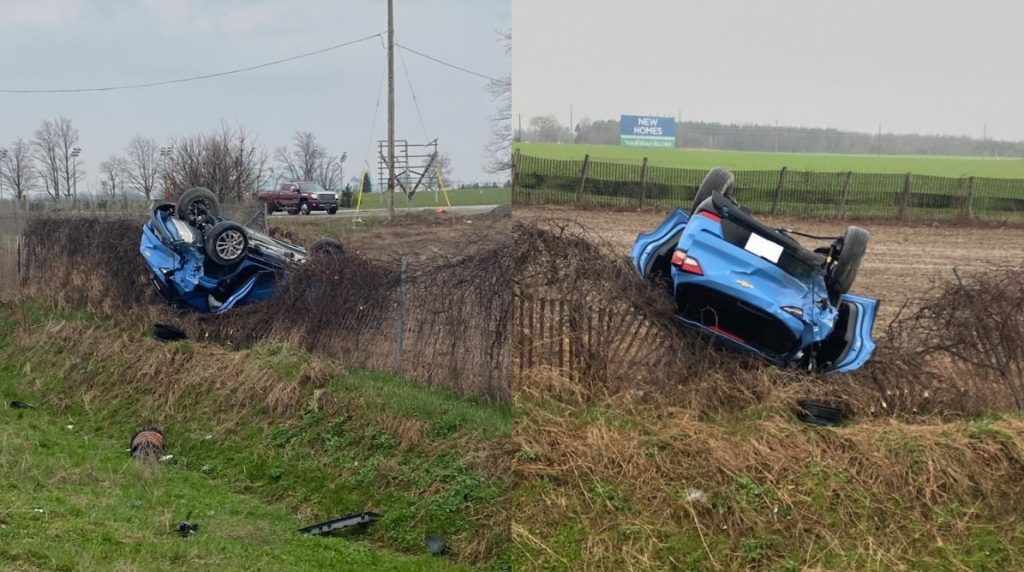French president says no survivors in Air Algerie crash
Posted July 25, 2014 5:42 am.
This article is more than 5 years old.
PARIS – French soldiers on Friday secured one of the black boxes from the Air Algerie plane that went down in restive northern Mali with the loss of at least 116 people, French President Francois Hollande said Friday.
Terrorism has not been ruled out as a cause of the crash, although officials say the most likely cause is bad weather.
The black box was recovered from the wreckage, in the Gossi region near the border with Burkina Faso, and is being taken to the northern city of Gao, where a French contingent is based, Hollande told reporters after a crisis meeting with top ministers.
“There are, alas, no survivors,” Hollande said. “I share the pain of families living through this terrible ordeal.”
The jetliner carrying 116 people — including five Canadians — crashed Thursday in a rainstorm over restive Mali, and its wreckage was found near the border of neighbouring Burkina Faso. It was the third major international aviation disaster in a week.
The plane, owned by Spanish company Swiftair and leased by Algeria’s flagship carrier, disappeared from radar screens less than an hour after takeoff, en route from Burkina Faso’s capital of Ouagadougou to Algiers.
The president has said that France will spare no efforts to uncover the cause of the crash — the third major plane disaster around the world within a week.
“There are hypotheses, notably weather-related, but we don’t rule out anything because we want to know what happened,” Hollande said.
“What we know is that the debris is concentrated in a limited space, but it is too soon to draw conclusions,” he added.
A French Reaper drone based in Niger spotted the wreckage, French Transport Minister Frederic Cuvillier told France-Info radio on Friday. Two helicopter teams also overflew, noting that the wreckage was in a concentrated area. A column of soldiers in some 30 vehicles were dispatched to the site, he said.
A statement early Friday from the Hollande’s office said the aircraft had been clearly identified “despite its state of disintegration.”
Quick discovery of the wreckage is “decisive” in piecing together what happened, the transport minister said, describing the aircraft as “disintegrated” and debris “in an apparently small area.”
“We think the plane went down due to weather conditions, but no hypothesis can be excluded as long as we don’t have the results of an investigation,” French Interior Minister Bernard Cazeneuve told RTL radio.
“Terrorist groups are in the zone. … We know these groups are hostile to Western interests,” Cazeneuve said.
The pilots had sent a final message to ask Niger air control to change its route because of heavy rain, Burkina Faso Transport Minister Jean Bertin Ouedraogo said Thursday.
French forces intervened in northern Mali in January 2013 to rout Islamist extremists controlling the region. A French soldier was killed earlier this month near the major town of Gao, where French troops remain. Separatist Touaregs also have been fighting each other.
The partner of Isabelle Prevost of Sherbrooke, Que., said late Thursday that he has been told the 35-year-old woman was one of the passengers on the flight.
Danny Frappier said he received a call Thursday morning telling him his partner was aboard the flight, which at that point was only reported as missing.
He said Prevost was on vacation in Africa and it was the family that was putting her up that first contacted him. Frappier said he tried to get information from official sources but that it came in dribs and drabs.
‘‘The only confirmation I have is that she was on the flight,‘‘ he told The Canadian Press. ‘‘We‘ll try to have as good a night as possible and we‘ll see who confirms what.‘‘
‘‘We’re hoping there’s part of her body that can be repatriated, some kind of proof that she was really there, that she’s really dead, I don’t know.‘‘
The couple has three children, aged 5, 7 and 9.
Radio-Canada earlier quoted Prevost’s partner as saying their children were meant to travel with her but that it was decided they should stay with him.
The network also quoted Burkina Faso native Mamadou Zoungrana, who works as a technologist at the Papineau Hospital in Gatineau,Que., as saying that his wife and their two sons, aged six and 13, were on the flight. CBC reported they are not Canadian citizens.
Prime Minister Stephen Harper issued a statement saying he was saddened at news of the crash.
“Our thoughts and prayers are with the families and friends of the passengers and crew who lost their lives in this tragedy,” he said in the statement, adding that it was confirmed Canadians are among the victims.
Tweets from the account of Lynne Yelich, Canada’s Minister of State for Foreign Affairs, said consular officials are ready to provide assistance.
Nearly half the 110 passengers aboard the plane were French, and France is deeply shaken by the drama. The president promised to mobilize all French military and civilian means in the region and call on partners to help.
“We sent men, with the agreement of the Mali government, to the site, and they found the wreckage of the plane with the help of the inhabitants of the area,” said Gen. Gilbert Diendere, a close aide to Burkina Faso President Blaise Compaore and head of the crisis committee set up to investigate the flight.
French forces had joined the search for the Air Algerie flight, alongside Algeria and other neighbouring countries plus the U.N. peacekeeping mission in Mali, known as MINUSMA. Algerian aircraft also participated in the hunt.
Swiftair, a private Spanish airline, said the plane was carrying 110 passengers and six crew, and left Burkina Faso for Algiers at 0117 GMT Thursday.
In addition to the five Canadians, the passengers were 51 French, 27 Burkina Faso nationals, eight Lebanese, six Algerians, four Germans, two Luxembourg nationals, one Swiss, one Belgian, one Egyptian, one Ukrainian, one Nigerian, one Cameroonian and one Malian, Ouedraogo said. The six crew members were Spanish, according to the Spanish pilots’ union.
The crash of the Air Algerie plane follows a series of aviation disasters.
Fliers around the globe have been on edge ever since Malaysia Airlines Flight 370 disappeared in March on its way to Beijing. Searchers have yet to find a single piece of wreckage from the jet with 239 people on board.
Last week, a Malaysia Airlines flight was shot down while flying over a war-torn section of Ukraine, and the U.S. has blamed it on separatists firing a surface-to-air missile.
Earlier this week, U.S. and European airlines started cancelling flights to Tel Aviv after a rocket landed near the city’s airport. Finally, on Wednesday, a Taiwanese plane crashed during a storm, killing 48 people.
It’s easy to see why fliers are jittery, but air travel is relatively safe.
There have been two deaths for every 100 million passengers on commercial flights in the last decade, excluding acts of terrorism. Travellers are much more likely to die driving to the airport than stepping on a plane. There are more than 30,000 motor-vehicle deaths in the U.S. each year, a mortality rate eight times greater than that in planes.
With files from The Canadian Press










